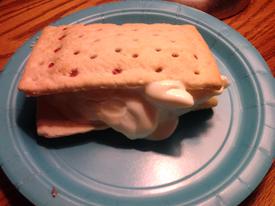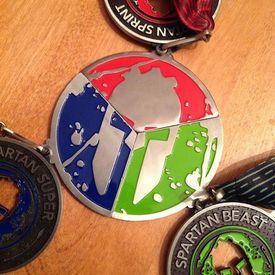Runner With HRM

divaford140
Posts: 2,511 Member
Good Morning MFP Peeps! This is a question to all you runners who use a heart rate monitor device. So I'm all hi-tech now got my new heart rate monitor so here's my question. When I'm running my heart rate is way above what my average to max is suppose to be at! I'm not really running fast (on a treadmill it's at 5.0 - which trust me for me is a real victory - lolol). It took me a bit to work up to 5.0 and hold for 30 min or more. I gradually want to increase my speed so I can improve my race timing (I do mostly 5Ks) but my goal is to drop another 50 lbs and reach goal this year. I don't want my running workouts to not be effective towards my weight loss goals and I really don't want to go slower but shouldn't I keep my HR in the target zone to keep burning fat? I mean I want it all hence my name - lololol! So holla back at me with some feedback!!! Thanks in advance!!!! 
0
Replies
-
I think it's fine. You'll burn fat above the fat zone aswell, but you'll also strengthen up your muscles.0
-
You have to many goals that aren't going to all work out nice.
for a 5k your heart beat should be though the roof! pounding. Your not the average person, you are a high performing athlete now. The rules don't always apply.
I don't look at running helping me with weight loss, that's eating at a calorie deficit. Running makes me awesome. Keep those separate and it all fits together. :drinker:
The way to increase your speed now is with interval training. That is really going to push your heart rate up.0 -
I ditched the HRM when running... It wasn't helpful, IMO. I was obsessed with target HR, and it kept me running slower than I am capable of running. You'll be able to tell your limits when you run, if you're overly sore or can't complete your workout, you're pushing too hard. Otherwise, ditch the HRM for running, you'll be happier for it.0
-
As time goes that will get lower.
When I first got my HRM I was usually in the 155-165 bpm range for a 5k run. I did a 5k last night doing intervals (1 min at speed 5, 1 min at speed 6) and my average was in the mid 140's. I am doing more endurance running now (using Hal Higdon's half marathon plan) so now a 5k is a easy run for me. On my last distance run (8 miles) I peaked at 156 bpm, but my average was in the 140's.0 -
I was confused about this once too... I thought that the lower zones burnt more fat... but it's wrong, it's just a certain % of fat burnt is fat.
for example, as I can't remember the figure, lets say it's 85% fats, 10% carbs, 5% protein, and 100kcal/hr.
As your heart rate increase, the fat % goes down, but the carb % goes up, say you're at 80% of your HR, it might be more 75% carbs, 15% fats, 10% proteins, but 900kcal/hr.
Even though it's only 10% of fats, of those fats - in this example, 135kcal of that would be fats, where as before it was only 85kcal of carbs...
so it's all relative... the lower HR the less kcal you'll be burning, so a % of that will be fats, but with the higher HR, you'll burn more kcal, and more fats, even though it's a smaller relative percent.
Hope that makes sense?
I use a HR for cycling and running... if you know where you max limits are - you can essentially sit just under your max and go full out, you'll find once you hit your max, you'll just be out of breathe, so for me it's great... but I'm not everyone.0 -
I run with a HRM, but I really only use it for 2 things: to have an estimate on calorie burn (so I don't under eat), and to watch the cumulative training load data (so I can see if I'm over training - for a math geek, this data is fascinating).
Don't worry too much about the 'zones' on the HRM.0 -
I think what is referred to as the "Fat burning zone" should be referred to us "minimum effort required to burn fat".
I use the HRM. I basically figure out what my baseline is for my "I could run forever" pace that i'd use on long runs, and then try to kick it up at intervals. I normally run in the 140s, I try to bring up intervals to 150s and 160s so that my body doesn't get too used to a specific speed.0 -
You are headed in the right direction. However, you need to seperate the running for weight loss purposes from running to improve fitness. Both will occur if your caloric intake is balanced as you train for fitness.....and if your on this website, its obvious thats something you know about. So, lets focus on the fitness.
There are several approches to achieve your fitness goal. Ultimately though you need to determine your specific heart rate zones for your personal fitness level and other factors such as current weight, sex, age and lifestyle. Once you have your personal heart rate zones figured out, there is a lot of books and mostly credible web sites on how to train in zones to improve your fitness; and thus, achivee faster race times. Focus on finding a training program that uses interval traning (really the best way to train for 5Ks).
trainingpeaks.com has several training programs you can purchase based on age and experience level and your goals. The ones written by Joe Friel use HR zones to train by. Ultimatley though you will want to work on improving your pace (speed per mile) once you hae achived a certain level of fitness. But one step at a time.
If you are really interested in all the sceince around training and how to train, then I suggest you pick up Joe Friels, The Triathlete Training Bible. It covers everything you ever wanted to know about the subject.
Best of Luck!0 -
I don't look at running helping me with weight loss, that's eating at a calorie deficit. Running makes me awesome. Keep those separate and it all fits together. :drinker:
Love it^^^
My heart rate gets very high when I run too, I'm sure if I put on my HRM now and ran (versus when I first started) it would be awhole lot better.....if you are running 5K's (and not doing distance work) then keep up what your doing. Better burn.0 -
IMO, running should be used more in cases where you are trying to improve your endurance. Its only from a mixture of cardio and strength training where great amounts of fat are lost. I usually only use my HRM in cases where I need to track how many calories I burned while running or walking. If you are training for a specific event, then I would forget trying to stay in your zone and focus more on your endurance and distance training.0
-
Keep it coming!!!! This is great advice!!!!! You guys know your stuff - lololol!!!!0
-
I only use the HRM for calories burned when I'm running... I'm in it for the speed and endurance and the calorie burn.0
-
I use my HRM to help me build up endurance
Have you heard of Mittleman? Maffetone?
http://philmaffetone.com/180formula.cfm
There's a Mark Allen article somewhere online called "Want Speed? Slow down"
http://www.markallenonline.com/maoArticles.aspx?AID=2
Have you seen the MARCO pace calculators online?
http://feelrace.com/marathonperfect.html
The HRM is very useful of course but it depends on what your goals are.
Some use it to get their HR up high, and others use it to keep their HR low.
:-)0 -
 I too got myself a fancy HRM so I could better track what was going on.
I too got myself a fancy HRM so I could better track what was going on.
After a run on the treadmill at the gym, I asked my husband's trainer-- "what does it mean if half the time, I was above my range"-- (I wont go into all the details he provided, but to simplify), I burned a lot of calories, but didn't burn as much fat. Keeping my heart rate just below the upper range for a longer period of time will burn more fat. So, he told me to slow down and save my energy for a longer work-out.
So, it all depends on what your trying to accomplish. :bigsmile:
And as you can see from my ticker below, although I'd like to lose a few pounds, I "really" need to lower my BF%.0 -
I only use the HRM for calories burned when I'm running... I'm in it for the speed and endurance and the calorie burn.
^^This is me.
Run as fast and as long as you can. Even if you're not in the "fat burning zone", there's good stuff happening.0 -
I was glad to see the input from some of the more seasoned athletes who appear to agree that an HRM isn't very useful for this purpose. (I think they are more useful for someone who has a heart condition and needs to keep their HR down.) I gauge the intensity of my workout on my breathing. If I can sing an aria, then I'm not working hard enough; if I'm gasping for air, then I need to slow it down. You're burning calories either way, but the harder you push yourself, the more calories you burn. That's just physics.
As for your speed, it's all about you and where your fitness level is. Nobody else matters. (Right now, since I'm just starting after years of being a couch potato, I can't jog as fast as I used to walk!)
Diva, I see you do a boatload of cardio, but do you weight train? That is an excellent and efficient way to burn calories because you build muscle. Increased muscle mass translates to a higher metabolism, which means you burn more calories even at rest. (It's great for your bone density, too, which we 40+ girls need to take care of.)0 -
And you deserve it all
 I don't use a hrm, but could you switch up your speed? x miles within the range for calorie burn, then x miles above the range for speed?
I don't use a hrm, but could you switch up your speed? x miles within the range for calorie burn, then x miles above the range for speed?
Have you won a 5k or top 10? I'm impressed at 5k itself. I'll join you for a 1k...0
This discussion has been closed.
Categories
- All Categories
- 1.4M Health, Wellness and Goals
- 398.5K Introduce Yourself
- 44.7K Getting Started
- 261K Health and Weight Loss
- 176.4K Food and Nutrition
- 47.7K Recipes
- 233K Fitness and Exercise
- 462 Sleep, Mindfulness and Overall Wellness
- 6.5K Goal: Maintaining Weight
- 8.7K Goal: Gaining Weight and Body Building
- 153.5K Motivation and Support
- 8.4K Challenges
- 1.4K Debate Club
- 96.5K Chit-Chat
- 2.6K Fun and Games
- 4.8K MyFitnessPal Information
- 18 News and Announcements
- 21 MyFitnessPal Academy
- 1.5K Feature Suggestions and Ideas
- 3.2K MyFitnessPal Tech Support Questions











